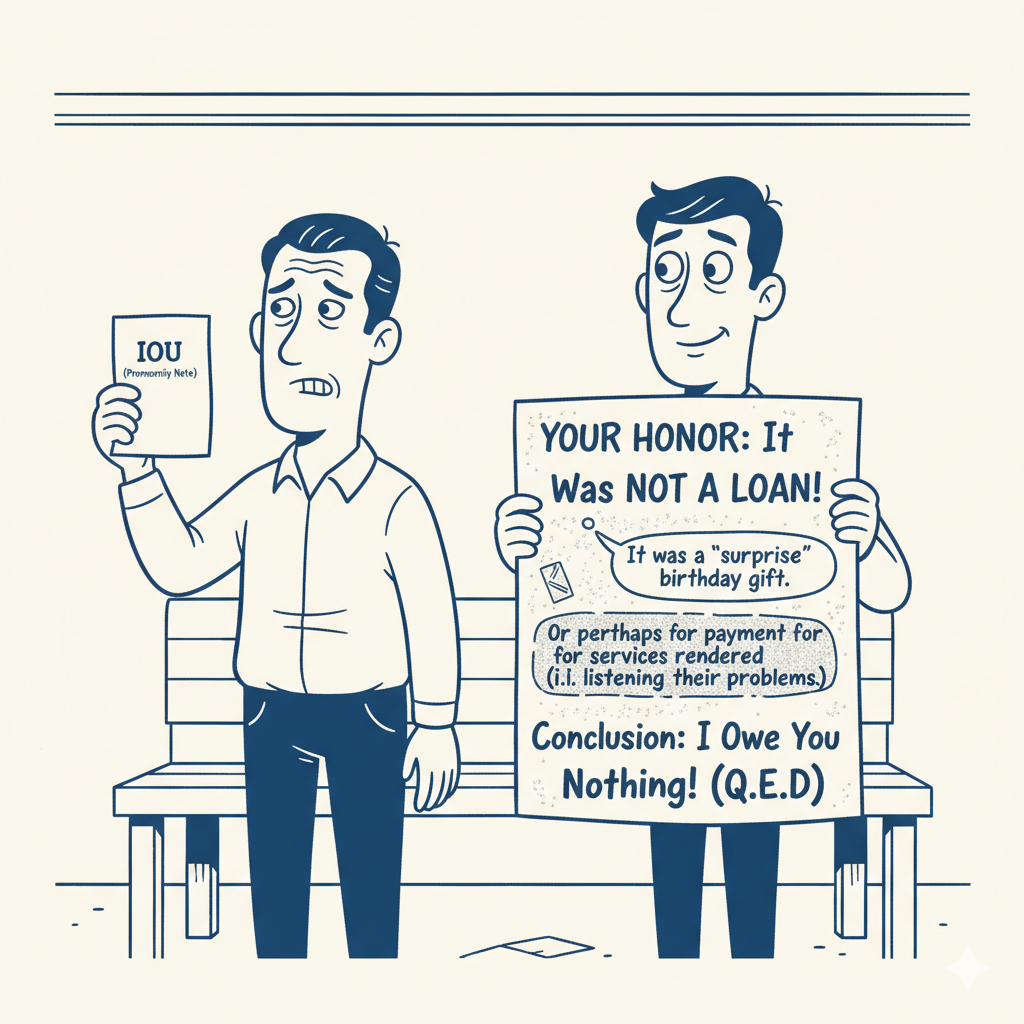Personal lending and borrowing are widespread. For this reason, lawsuits for unpaid personal loans of $50,000 or less frequently appear in Toronto Small Claims Court and other Small Claims Courts.
Promissory Notes in your Small Claims Court lawsuit
- If you lent money to another person and they did not pay it back, your best option is the Small Claims Court. Your chances of collecting and succeeding in a personal loan lawsuit in Small Claims Court will depend on the circumstances of borrowing.
- Ideally, you have a promissory note (sometimes referred to as an IOU, or “I owe you”). A promissory note is a written document that the borrower has signed. It usually details:
- How much she or he borrowed
- Who borrowed from whom
- When the borrowing took place
- When the borrower should repay the loan
- Any interest that applies to the loan
- Promissory notes can be simple. They needn’t necessarily be formal, notarized documents (though it definitely won’t hurt if they are). Oftentimes, a handwritten piece of paper with all the important information can be sufficient.
Why It’s Better to Have a Promissory Note
The promissory notes are important. They increase your chances of success in a lawsuit against the borrower. A promissory note ascertains the amount of the loan. It undoubtedly confirms that the said amount was, in fact, loaned. A promissory note does not give the borrower a chance to argue. The most frequent defence to a small claims lawsuit regarding repayment of a personal loan is that the loan was not actually a loan. Borrowers may insist that it was a repayment of a debt, or money for a service, or some other such thing – some defences can get creative.
How to Sue Someone and Collect an Unpaid Personal Loan Without a Promissory Note
- We say that a promissory note is ideal. However, most of the time, people lend money to friends. For this reason, the possibility of failure to repay the loan doesn’t enter the lender’s mind. So they often neglect to obtain promissory notes.
- Do not despair if you don’t have a promissory note, however. If you present your case correctly, you can still be successful in your small claims lawsuit even without one.
- If you don’t have a promissory note, the next best thing is any written confirmation of the debt. This could include emails, letters, notes, text messages, or any other form of communication that discusses the loan specifically as a loan.
- In the absence of written confirmation, proving your small claims court case is somewhat more difficult. Nevertheless, it is not impossible.
- You would need to find witnesses who can verify that you provided a loan. You can provide bank account statements or cheques that show you actually made the loan. Also, you may try to get and assess other evidence that may be relevant to your particular small claim.
- This would be our primary focus should you wish to retain Spectrum Paralegal to represent you in your small claims lawsuit regarding a personal loan. Please don’t hesitate to contact us for a free case assessment.
If the borrower files a defence that denies that the sum she or he received was a loan, you should prepare to address whatever issues the defence raises.
Other Things to Know while Suing Someone in Small Claims Court to Recover a Personal Loan
In addition to thinking of how to best prove your small claims lawsuit about an unpaid personal loan, there are two other things to keep in mind:
- You need to know where the borrower lives, works, or where you can otherwise find him. You need it for the service of the court documents. If the borrower disappears and you don’t know where they can be found, you may need to investigate their whereabouts.
- You need to consider the limitation period:
-
- The limitation period is the time after the expiry of which you cannot file a claim any longer.
- The limitation period can vary from case to case, but generally, it is two years.
- The key here is that the two years typically do not begin when you give the loan. The limitation period for unpaid personal loans usually expires two years after the borrower realizes that the loan will not be repaid.
- If the loan had not been paid for a long time, you might need to address this issue during the Small Claims Court procedure.
For Those Being Sued in Small Claims Court for Not Repaying a Personal Loan
- If someone is suing you for failing to repay a personal loan, your best course of action depends on the circumstances of the case.
- If you actually borrowed money and did not repay it, it would generally be difficult for you to defend yourself in the Small Claims Court. It is especially so if the plaintiff has a promissory note or another type of written confirmation of the debt.
- Moving forward with a substantial defence (denying that you owe anything) may then simply cause delay and inflate your costs.
- If you are in such a situation, it may be more efficient for you to settle with the plaintiff to structure a mutually acceptable payment plan. A paralegal can often assist in communicating with the opposing side in such cases.
- However, you may still have a limitation period defence, a defence that the interest on the loan is excessive or illegal. In some cases, the lenders sell the loan to debt management companies. The proper assignment of the personal loan debt may also be at issue.
If you had not actually borrowed the money, your defence will, of course, vary depending on your particular circumstances. You may need to show that, for example, the “loan” was a payment for goods or services, repayment of another loan, or whatever the case may be.
If your signature was forged on a promissory note or another written confirmation of the debt, you might need to provide a forensic analysis of your signature. If you would like a free assessment of your particular situation, please don’t hesitate to contact us.







